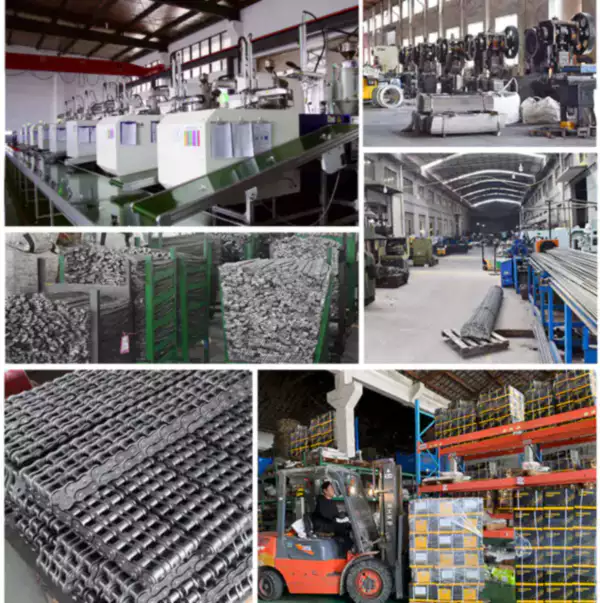Gripper chains are an integral component of many conveyor systems, used to move products from one location to another. The chains are designed to grip the product securely, allowing it to be transported efficiently and effectively. In recent years, advances in manufacturing technologies have led to the development of gripper chains that are more flexible, durable, and versatile than ever before. In this article, we will explore some of the innovations that have led to these improvements.
1. Improved Materials
One of the key innovations in gripper chain design has been the development of new materials. Traditional gripper chains were constructed from steel or other metals, which were durable but inflexible. Today's gripper chains are made from a variety of materials, including plastic and composite materials, which are much more flexible and lightweight. These materials are also resistant to corrosion and wear, making them ideal for use in harsh environments such as food processing plants and other industrial settings.

2. Modular Design
Another innovation that has improved the flexibility of gripper chains is the modular design. Traditional gripper chains were constructed in a continuous loop, which made them difficult to repair or modify. Today's gripper chains are built from modular components that can be easily replaced or reconfigured as needed. This modularity also allows for easier maintenance and cleaning, reducing downtime and improving overall efficiency.

3. Increased Customizability
Modern gripper chains are highly customizable, allowing them to be tailored to specific applications. This customization can range from the size and shape of the gripper elements to the spacing between them. Gripper chains can also be designed to work with a variety of conveyor systems, allowing for greater flexibility in the design and layout of production lines.

4. Advanced Manufacturing Techniques
The development of advanced manufacturing techniques has also contributed to the increased flexibility of gripper chains. These techniques allow for greater precision in the manufacturing process, resulting in gripper chains that are more consistent in their performance. Advanced manufacturing techniques also enable manufacturers to produce gripper chains in a wider range of sizes and shapes, further increasing their versatility.
5. Integration with Other Technologies
Finally, the integration of gripper chains with other technologies has led to further improvements in their flexibility and versatility. For example, the use of sensors and computer controls can allow gripper chains to adjust their grip on products based on their size, shape, and weight. This integration with other technologies also allows for greater automation in production lines, reducing labor costs and improving overall efficiency.

Sprockets for Gripper Chains
Gripper chains require sprockets to operate properly, and the quality of the sprockets is just as important as the quality of the chains themselves. At Everpower, we offer a wide range of sprockets that are specifically designed to work with our gripper chains. Our sprockets are made from high-quality materials, and are engineered to provide reliable performance in even the most demanding applications.
Our Advantages
When it comes to gripper chains, there are many manufacturers to choose from. Here are just a few of the reasons why you should choose Everpower:
- We are a leading manufacturer of gripper chains, with years of experience in the industry.
- We use only the highest-quality materials in our products, ensuring that they are durable and reliable.
- We offer a wide range of customization options, allowing our products to be tailored to your specific needs.
- We have a commitment to customer service, and will work with you to find the best solutions for your needs.
- We offer competitive pricing, making our products an excellent value for your money.

Gripper Chains Purchasing Guide
| Parameter | Description |
|---|---|
| Size | Determine the size of the gripper chains based on the product being transported and the conveyor system being used. |
| Material | Choose the material that best suits your application, based on factors such as durability, flexibility, and resistance to wear and corrosion. |
| Customization | Consider the level of customization available from the manufacturer, and choose a product that can be tailored to your specific needs. |
| Price | Compare prices from different manufacturers, taking into account factors such as quality, customization options, and customer service. |
| Manufacturer | Choose a reputable manufacturer with a track record of producing high-quality products and providing excellent customer service. |
Q&A
Q: Can gripper chains be used in food processing applications?
A: Yes, gripper chains are highly versatile and can be used in a wide range of applications, including food processing. However, it is important to choose a chain that is made from materials that are FDA-approved and suitable for use in food contact applications.
Q: Can gripper chains be repaired if they become damaged?
A: Yes, many modern gripper chains are designed to be modular, which means that damaged components can be easily replaced without the need for extensive repairs.
Q: How do I choose the right gripper chain for my application?
A: Choosing the right gripper chain requires careful consideration of factors such as the size and weight of the product being transported, the conveyor system being used, and the environment in which the chain will be operating. It is also important to consider factors such as customization options and price when making your decision.
Edited by Zqq.
